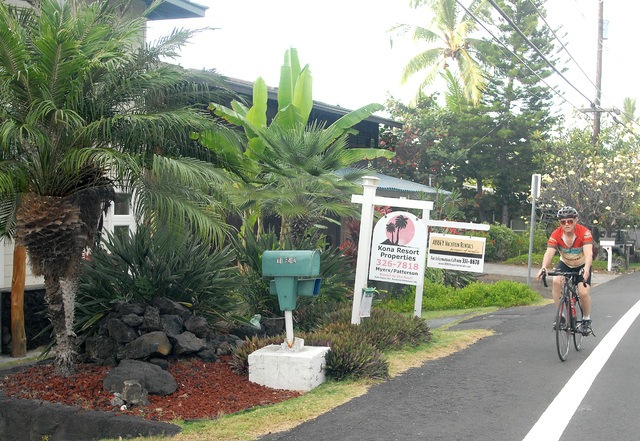County Council members are calling for a balance that would allow revenue-generating vacation rentals in some areas while keeping them from consuming neighborhoods in others.
The council Finance Committee heard a 90-minute presentation from computer analyst Stefan Buchta, who’s concerned about his Leleiwi neighborhood being overrun by the short-term rental business.
Buchta said Big Island residents are being squeezed out of neighborhoods by out-of-state investors who pay cash for properties and turn them into vacation rentals. Making a presentation at the request of Hilo Councilwoman Sue Lee Loy, Buchta said the easy profits made by short-term vacation rentals reduce the inventory of housing available for families on the island who can’t find long-term rentals and can’t pay cash to buy a home.
Buchta said the original concept of “home-sharing,” where people rented out a room in their home, has dwindled to 11 percent of vacation rental revenue. Now, the market is dominated by whole-house rentals, many owned by commercial hosts who own more than one house or condo unit.
He emphasized home-sharing and small-time vacation rentals can enhance the economy without hurting neighborhood character, the way a bee can collect pollen from a flower without harming it.
“There are bees and there are ants, and if there are too many ants, they’ll begin to kill the flower,” Buchta said. “The commercial operators are abusing the system. … These people are running multi-million-dollar businesses in residential neighborhoods.”
Buchta estimates taxing Big Island vacation rentals could bring $20 million to $30 million annually in taxes to the state.
Council members, who are set to hear a bill in the coming months that would limit vacation rentals to commercial and hotel/resort districts, said allowing short-term rentals could create tax revenue, but they also are hearing from constituents worried about the character of their neighborhoods.
“It became very apparent to me there is a need to address this issue,” Lee Loy said. “It’s an issue that affects not only my community but communities all across the island. “
Kohala Councilman Tim Richards agreed.
“There’s not a one-size-fits-all,” Richards said. “We have to strike that balance.”
Kona Councilman Dru Kanuha said he can see an economic upside, but he gets calls every day from constituents with complaints about the rentals.
Many residents don’t welcome the vacationers.
In testimony, Jolene Mears said the Keauhou Uka community in Kailua-Kona is no longer a quiet residential neighborhood thanks to vacation rentals. She said the party-like atmosphere of large houses in particular lessens the quality of life for the residents.
“We are regularly … woken up by screaming, laughing, cursing, drunken brawls and have absolutely no ability to get the group to quiet down,” Mears said.
She said calling the police doesn’t always get quick results because the police are overwhelmed by the number of transient rentals cropping up in the area.
“In addition to the noise that seems constant, we have seen guests urinating over their railing, strutting around naked and have found litter in our backyard,” Mears said.
One testifier said the belief is unfounded that allowing vacation rentals in residential areas will result in them being overrun with tourists.
“Tourists aren’t rats,” said Cheryl O’Brien, “and the properties they stay in are almost across-the-board better cared for than others.”
Email Nancy Cook Lauer at ncook-lauer@westhawaiitoday.com.







Strutting around naked and urinating over the railing.
“Buchta estimates taxing Big Island vacation rentals could bring $20 million to $30 million annually in taxes to the state.”
.
Dear Mr. Buchta, Vacation Rentals ALREADY are Taxed.
The small print is that not Everyone that COLLECTS Get and TAT Taxes, actually then REMITS those Collected State and County Taxes.
I am a small time single rental LEGAL tax remitting vacation rental.
Perhaps I am mis understanding:
When I rent to Anyone, I am essentially collecting the GET and TAT taxes in the final billed amount.
And then I remit it to the State of Hawaii.
It is NOT all my money.
That $100 dollar bill does NOT All belong to me.
I as a business, Collect and then REMIT those collected taxes to the State and County of Hawaii.
No matter what a person Might call total revenue ….These TAT and GET taxes are included and OWED to the state of Hawaii.
This is to say that Many rentals COLLECT the money but do NOT remit it to the State.
I just want to be clear on this point.
Those collected tax dollars are going into someones private pockets while their business and their guests USE and ENJOY the services and facilities that Collected Tax Dollars make Possible.
The money is already there and being collected.
Tell me, what is that called ?
When you are essentially collecting and not remitting ?
Just saying….I personally play by the Law and the Rules yet have to compete with scofflaws that Leach off of the LEGAL rentals and County and State resources.
Call it what it is :
Collected and Not Reported or Remitted Tax monies.
Perhaps I am mis understanding ?
That is very interesting, thank you! Am aware of the TAT/GET tax laws, state side, but I had no idea of the actual practice of charging guests while not remitting.
Thanks for the discussion and thoughts.
If one is collecting money for a rental, one might call that Money anything they choose.
It seems to me though that a rental owner OWES the state GET and TAT taxes no matter what they may term the money that comes in.
One may “say” they are not collecting tax but I do beg to differ.
The taxes are a fixed percentage of income.
Thus the percentage is DUE.
If you collect money you Owe that percentage.
Sadly Paying these taxes is Not “optional”
Locals do not buy homes because the demo rats tax them out of existence. 90% of the homeless are in fact locals. 90% of home buyers are outsiders. Demo rats are the problem along with the fools who voted to exterminate themselves. Congratulation foolish voters, you got exactly what you wanted.
please quote where the 90 % figure you mention is posted as fact.
Also….who on Earth is an “outsider” ?
( anyone that arrived after me or you ? )
Lets face it…..
Native Hawaiians are the ONLY Non outsiders here in this land.
“Haole” is Not a bad term….it is “Foreigner”
It is one of those words that derives it’s real meaning from HOW it is said…..not what is said.
( Remember ” stink eye ” ? )
Old Stevo wouldn’t know a fact if it fell on him.
Maybe when you stop posting your logical fallacy arguments, which seem to be just about everything you post in response to every article, you might have something to contribute beyond what currently is drivel coming from your mouth, but I think that would be a stretch for you.
Hawaii Act 204 requires all rentals to include Tax ID
Posted on February 18, 2016
A new law that went into effect Jan. 1, 2016, Act 204 of the 2015 state Legislature requires all advertisements listing short-term rentals to include a tax registration identification number.
Individuals who do their own advertising – online or otherwise – are now also required to include their registration number.
The law says citations may be issued to any noncompliant listing site, with fines between $500 and $5,000 a day. Violators could also be subject to criminal penalties, including up to a year in jail.
Act 204 at-a-glance:
If you don’t live on the same island as your vacation rental, you need to name a Local Contact. The Local Contact is a person or a company resident on the island (when companies are local contacts they must have someone who resides on the island).
You must post your Hawaii Tax ID (your TAT ID number) number conspicuously in all advertisements and in your rental (note: we have always had to post our GET number in our rental);
You must identify your local contact by name, phone number and email address to your guests before they check in and within the rental property;
There is no longer any requirement for the HOA to collect and remit tax ID and local contact information annually;
Your online advertising system, i.e., HawaiiLandlord, VRBO, FlipKey, AirBnB, must ensure you have posted your Hawaii Tax ID (your TAT ID number) in your advertisement;
The same rules now apply to time shares and homes as to other transient accommodations; and,
The fines for non-compliance are very steep and include a monetary fine and a prohibition against operation.
What do you need to do?
Make sure that your Hawaii tax identification number (your TAT number) is posted on all of your websites and advertisements.(Hint: check that it is still there. Sometimes your advertiser updates their site and information is lost)
Make sure your Hawaii tax identification (both TAT & GET) certificates are posted conspicuously in your rental. If you have lost your certificates, contact the Department of Taxation for a replacement copy.
Make sure your local contact’s name, email and phone number are posted conspicuously in your rental and that this information is sent to your guests before they arrive.
Failure to comply with any of these could result in heavy fines and a cease and desist order. We have every reason to believe that the DOT is getting ready to very actively enforce these rules this year.
The Department of Transportation is gonna enforce?
( note: Dept. of Taxation not Dept. of Transportation )
That seems to be a big part of the problem.
Enforcement.
Other articles in this series in the Tribune Herald point out that Only ONE out of FOUR vacation rentals is LEGAL.
I have to wonder ( as this is Tax Time now ) is it true that for every ONE Dollar I as a Legal Rental remit … the “other” $3.00 is Not ?
The county solution is top RAISE the GET tax by 1/2% for Law Abiding business AND Our Guest Tourists, rather than pick up the money on the table now ?
Yes….Enforcement is not happening and big talk is all I have heard for 5 years now.
Laws come and laws are not enforced.
One out of Four potential guests is renting an Illegal Rental????…sounds unbelievable.
ONE TAT and ONE GET Tax Number for MULTIPLE properties is a GIANT LOOPHOLE that cultivates abuse.
Solution ?
ONE Property = ONE TAT Number
TWO properties = TWO TAT Numbers.
Just curious Ladies and Gentlemen of Our County Council Representatives.
Just how Many FINES for non compliance to the LAW have been collected in dollars during the Past TWO YEARS ?
( answer please : ???? )
more than a dollar, less than a million ??????
Ask Dru Kanuha, he put the legislation initiative forward with little follow-up. You want to fix the problem of lax government in Hawaii, start at the county council and emnd better from them.
Sorry but people who choose to live and work here and value their properties don’t want to be overrun by short term vacation rentals in their neighborhoods. Fortunately, many neighborhoods have protective provisions incorporated into them and have legal recourse if a home sale results in a short term vacation rental situation, particularly when it is communicated to the finance company before the close of sale. Do your research, many subdivisions have protective provisions in place and we send them before every close of sale as the real estate agents sometimes fail to disclose to their clients.